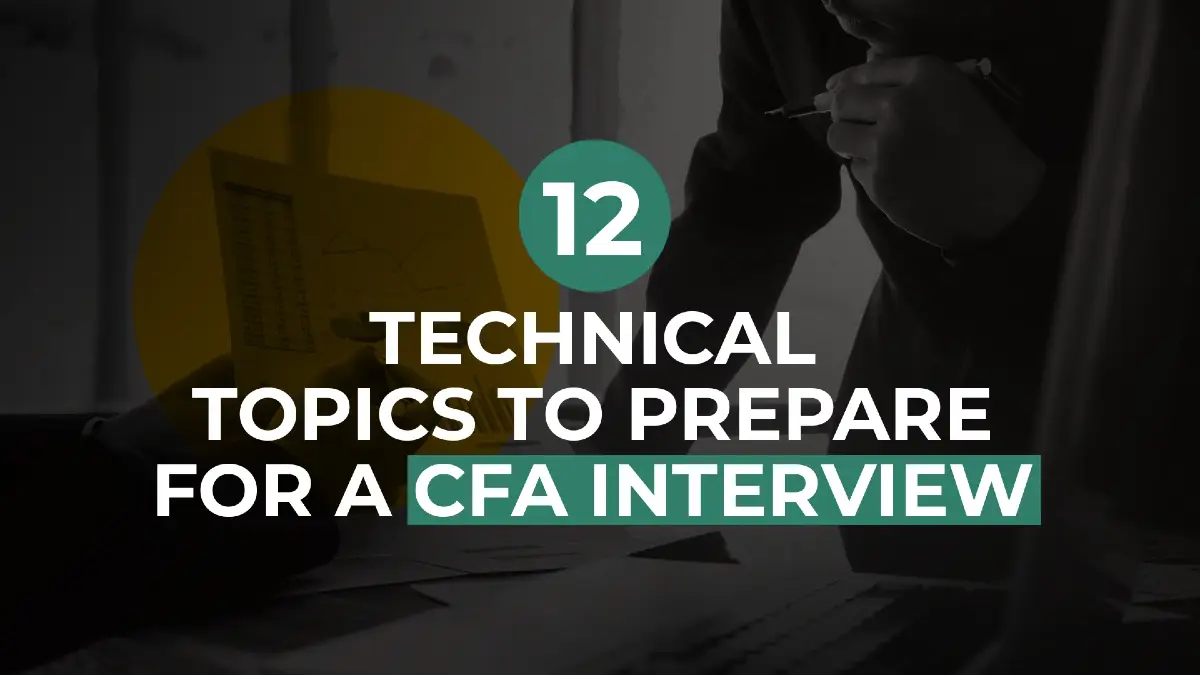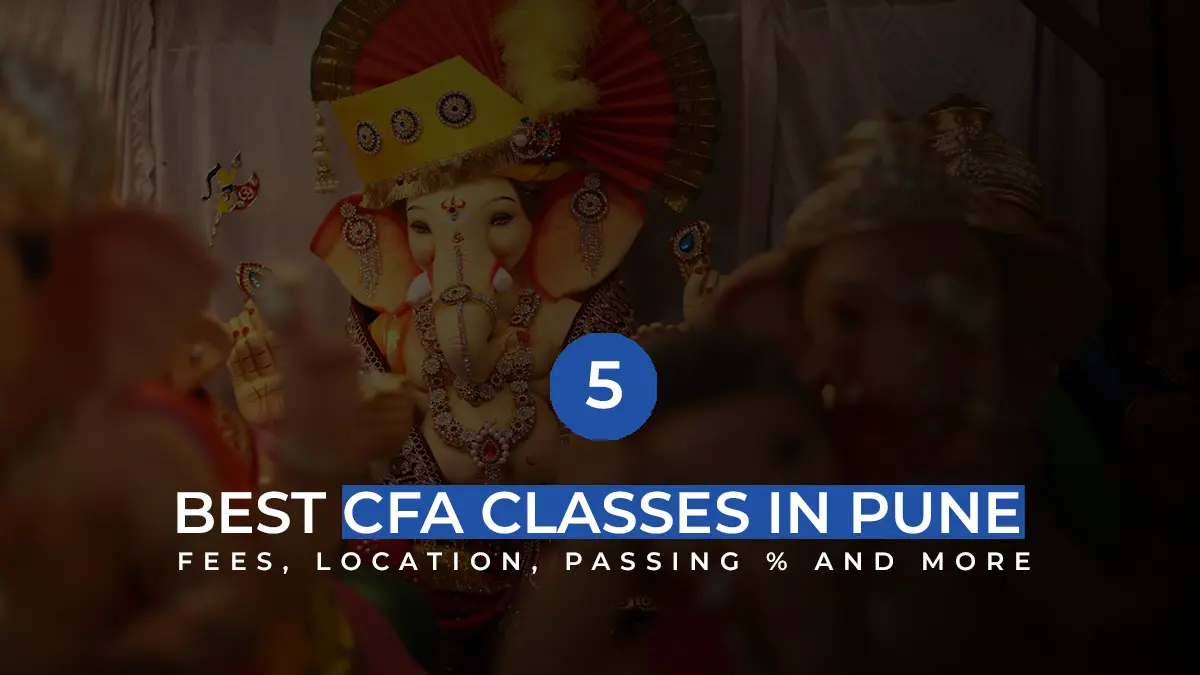
Ask any finance professional what the toughest part of the CFA certification is, and they’ll tell you it’s cracking the CFA interview.
The Chartered Financial analyst program is not for the faint-hearted. It’s a highly coveted, globally-recognised qualification that is the benchmark for excellence in the investment industry. The CFA syllabus is rigorous and ambitious. The topics include economics, quantitative methods, portfolio management and ethics.
It is a detailed-oriented and cohesive course that transforms aspiring students into competent financial experts.
There is a reason why the CFA interview questions and answers session is so intensive. Recruiters want to know if you are well-equipped to take on the complicated and demanding world of investment services. CFA professionals work in multi-billion dollar firms and Fortune 500 companies. They are often hired by global giants such as the big 4, JP Morgan, Barclays and Indiabulls. So you really need to bring your A-game.
Your interviewer won’t make it easy for you. You will be asked the tough questions and showcase your proficiency on the spot. It’s easy to get a bit anxious before your CFA interview. All that is standing between you and your future are a few questions. Answer them correctly, and you can start your journey as a financial analyst. Too much pressure? Don’t worry. We’ll help you overcome this final hurdle. Here are some of the topics asked at the CFA interview.
Read – Top Job profiles & 5 tips to get a job after passing CFA level 1
12 Technical Topics You Should Know Before Entering InThe CFA Interview
To ace the CFA interview questions, you must first understand what the recruiter is looking for. They want a professional who knows the complexities and nuances of this volatile industry. They need to ensure your technical knowledge is on point. You will be tested on core concepts, as well as your ability to handle challenging situations. You may not be able to train for questions that require on-the-spot thinking. You can, however, prepare for the technical aspect of the CFA interview. Here are some concepts and topics you should read up on before you meet your recruiter.
- Financial modelling
Did you know many companies prefer CFA professionals with financial modelling knowledge? Well, it’s true. You should be well-versed in the basic concepts of this method. It is even better if your familiarity with this is advanced. A certification in financial modelling will also sound very impressive during the CFA interview. It’s a bonus skill and can get your resume shortlisted over your peers.
Read – How are CFA And Financial Modeling Connected?Why Should You Study Both in the Same Course?
- Valuation techniques
Here’s one of the CFA interview questions you might be asked.
“What’s the single best evaluation technique?”
Careful, it could be a trick question. There is no right answer here. The techniques will vary, depending on the situation. You need to ask for more details and get the recruiter to devise a scenario for you. Then you need to confidently explain your chosen valuation technique and back it up with facts and figures. It can help if you study different plausible situations and prepare a few quick calculations in advance. This will prove your quantitative skills and level of knowledge during the CFA interview.
- Ratio analysis
Ratio analysis is a very significant part of the CFA syllabus. Analysts are expected to know the formulas and apply them to real-world situations. You should also know how to compare ratios across organisations to derive a logical conclusion. During the CFA interview, Recruiters will expect you to showcase your expertise in ratio analysis and answer a series of questions about it. So ensure your concepts are sound.
Did you know, you could easily ace the CFA Interviews if you enrol with IMS Proschool
[/fusion_text]
- Current assets on the balance sheet
It’s highly possible that you could be asked about balance sheets as part of the technical portion of the CFA interview. Your knowledge of current assets and liabilities will be tested. You need to be aware of the impact that changes on a balance sheet can have, and how they can affect the working capital cycle. You will have to explain your points articulately, so ensure you have studied the material in advance.
- Cash flow analysis
Every qualified CFA professional knows that the flow of cash in and out of a company reflects its financial situation. It is a big part of your job to be familiar with the finer details of cash flow. Recruiters may ask you why some firms show net loss even if they have a surplus of cash. Or, you’ll have to explain why the reverse also happens sometimes. You must be clear on topics such as bad debt, accounts receivable/payable and non-cash expenses. There are many aspects of this topic that you could get as CFA interview questions. So make sure you brush up on your key concepts.
- Capital Asset Pricing Model (CAPM)
How well do you understand CAPM? Can you articulate systematic and unsystematic risk? Are you clear about alpha and beta calculations? The interviewer may even ask you to explain how you would go about calculating risk elements. These are all likely CFA interview questions. So make sure you have confidently grasped the subject matter.
Students enrolling with IMS Proschool get access to free CFA Interview Prep
- Discounted Cash Flow (DCF) and Free Cash Flow (FCF)
You could find yourself in a round of CFA interview questions and answers about DCF and FCF. This is one of the essential steps towards calculating valuation, and it is imperative that you have clarity on this subject. Do you know how free cash flow is calculated? How is it relevant to the business? What is the difference between cash flow and free cash flow? CFA students are taught these topics during the course, so you need to retain all this valuable information.
- Specialised sector knowledge
The industry is divided up into several sectors, with dedicated KPOs and brokerages handling specific areas. If your CFA interview is with one of them, you have to dazzle them with your expertise in the relevant sector. Read up on research metrics, revenue drivers and suitable valuation techniques. If there are any new developments, you better ensure you know about them.
- Latest economic developments
While your understanding of valuation and ratio analysis is very important, you also need financial knowledge beyond the textbook. You don’t work in isolation. Current events are very essential part of your job.
What are the latest events or advancements in India? What are the changes occurring in the global economy? Do you know about the international prices of gold or oil? How informed are you about the union budget? These are just a few CFA interview questions that could throw you off your game if you are not adequately prepared.
- Impact of currency on various sectors
Many employers are often worried about currency devaluation and how it affects different sectors, such as imports and exports. The CFA interview questions may contain one or two on this matter. You should study currency movement trends to understand the consequences. You can also try and analyse what causes this instability and how to resolve it in the future.
- Python programming language
Python is one of the most versatile, highly compliant coding languages that can be used extensively in the finance and trading industry. It is also relatively easier than other coding systems to learn, yet equally effective. Employers want future-ready professionals who understand that the world of finance and technology are steadily overlapping, and you can’t have one without the other. Some of the CFA interview questions may revolve around your understanding of Python. The CFA course now includes this programming language in level I & II, so your training will ensure you have the right answers during your interview.
- Data science and artificial intelligence
Today, data science and AI technology stand at the forefront of business operations across the world. The finance industry can also benefit tremendously from making data-driven decisions to improve productivity and performance. You must showcase your proficiency and expertise in using AI-based algorithms and investment-centric data applications. Finance firms have integrated advanced technology into the workplace, and you need to be comfortable with handing these systems. At your CFA interview, you may be required to talk about extracting valuable insights from data findings to make predictions about the finance markets.
How Proschool’s CFA Course Prepares You For Your CFA Interview
Interviews for financial analysts can be very intimidating. You need to ensure you are more than qualified to handle any of the CFA interview questions that come your way. IMS Proschool has designed a formidable coaching experience for students that equips them with the necessary skills and training. The teaching staff are all experienced experts who use active learning methods and hands-on learning tools to make the subjects easier to grasp. They simplify concepts and clear doubts regularly. Students understand the topics from a real-world perspective. This is especially important as it will enable you to explain technical matters during your CFA interview. Proschool also has a placement program for all students to help them apply for jobs.
Course highlights:
- Students are given personalised attention during the program.
- You can enhance your skills and learn through various study resources such as study prep books, practice papers and mock tests.
- You can attend classes at the nearest coaching centre or apply for online sessions.
- You will receive certifications from IMS Proschool and NSDC.
- You are trained to take on the tough questions during the CFA interview.
- You receive valuable tips regarding interview and resume writing etiquette.
In Conclusion
A CFA professional must have deep knowledge and understanding of technical terms and industry-centric concepts. A reputed professional institution can equip you with the training and skills to be a competent analyst. It can also help you prepare for your CFA interview questions and answers so you can crack the technical interview round. Just remember to be calm, confident and clear when you give your answers. You’ll be sure to ace your interview with the company of your choice.
Find out more about the CFA program here







Leave A Comment